

UT Arlington to lead $1.6 million research project focused on digital learning - News Center - UT Arlington. The Learning Innovation and Networked Knowledge (LINK) Lab at UT Arlington has been chosen to lead a $1.6 million initiative to connect and support researchers across the country as they examine digital learning’s effect on higher education today and in the future.
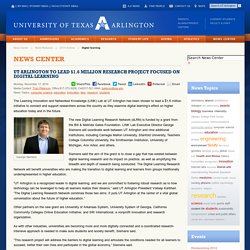
George Siemens The new Digital Learning Research Network (dLRN) is funded by a grant from the Bill & Melinda Gates Foundation. LINK Lab Executive Director George Siemens will coordinate work between UT Arlington and nine additional institutions, including Carnegie Mellon University, Stanford University, Teachers College Columbia University, the Smithsonian Institution, University of Michigan, Ann Arbor, and others. Siemens said the aim of the grant is to close a gap that has existed between digital learning research and its impact on practice, as well as amplifying the breadth and depth of research being conducted.
Pearson and CollegeOnTrack Collaborate to Provide Schools With Easy, Secure Access to Critical Student Information - Houston Chronicle. CollegeOnTrack joins Pearson’s growing independent software vendor partnership program.
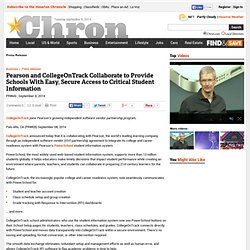
Palo Alto, CA (PRWEB) September 08, 2014 CollegeOnTrack announced today that it is collaborating with Pearson, the world’s leading learning company, through an independent software vendor (ISV) partnership agreement to integrate its college and career readiness system with Pearson’s PowerSchool student information system. PowerSchool, the most widely used web-based student information system, supports more than 13 million students globally. It helps educators make timely decisions that impact student performance while creating an environment where parents, teachers, and students can collaborate in preparing 21st century learners for the future.
Why Students Should Own Their Educational Data. Designing a textbook or lecture with the average student in mind may sound logical.
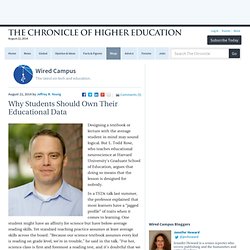
But L. Todd Rose, who teaches educational neuroscience at Harvard University’s Graduate School of Education, argues that doing so means that the lesson is designed for nobody. In a TEDx talk last summer, the professor explained that most learners have a “jagged profile” of traits when it comes to learning. One student might have an affinity for science but have below-average reading skills. Yet standard teaching practice assumes at least average skills across the board. Mr. To make his case, Mr. The Chronicle sat down with Mr. Q. In other areas of research that deal with individuals, like cancer research, they have a combination of big data and the moral imperative of trying to treat individuals with cancer.
OER and the Future of Publishing » For-profits lead the way as adaptive learning becomes more popular @insidehighered. The term "adaptive learning" can mean many things, even to colleges that have begun experimenting with it.
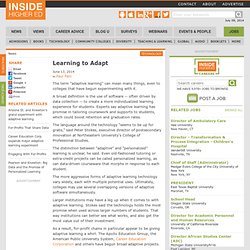
A broad definition is the use of software -- often driven by data collection -- to create a more individualized learning experience for students. Experts say adaptive learning has promise in tailoring coursework and supports to students, which could boost retention and graduation rates. The language around the technology “seems to be up for grabs,” said Peter Stokes, executive director of postsecondary innovation at Northeastern University’s College of Professional Studies. A Taxonomy of Adaptive Analytics Strategies. I almost never quote a blog post in its entirety, but this one from Dan Meyer is so good that I just can’t bear to cut a single word: Stephanie Simon , reporting for Reuters on inBloom and SXSWedu : Does Johnny have trouble converting decimals to fractions?
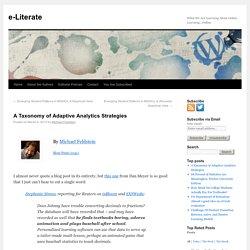
The database will have recorded that – and may have recorded as well that . Adaptive Learning Market Acceleration Program (ALMAP) Summer Meeting Notes. I recently attended the ALMAP Summer Meeting.
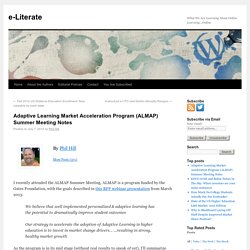
ALMAP is a program funded by the Gates Foundation, with the goals described in this RFP webinar presentation from March 2013: We believe that well implemented personalized & adaptive learning has the potential to dramatically improve student outcomesOur strategy to accelerate the adoption of Adaptive Learning in higher education is to invest in market change drivers… …resulting in strong, healthy market growth As the program is in its mid stage (without real results to speak of yet), I’ll summarize Tony Bates style with summary of program and some notes at the end. Consider this my more-than-140-character response to Glenda Morgan: @PhilOnEdTech was the agenda of the Gates Summit online at all? Originally planned for 10 institutions, the Gates Foundation funded 14 separate grantees at a level of ~$100,000 each. Gates has also funded SRI International to provide independent research on the results of each grant. Notes @ricetopher Good point. Adaptive Learning Technology: What it is, Why it matters.
By Senior Analyst, Brian Fleming Rising above all of the noise of today’s “techapolooza” sweeping across higher education, adaptive learning technology stands out above all of the rest.
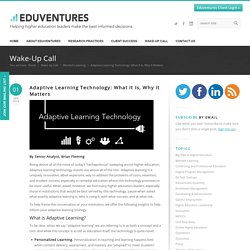
Adaptive learning is a uniquely innovative, albeit expensive, way to address the problems of costs, retention, and student success, especially in remedial education where this technology promises to be most useful. When asked, however, we find many higher education leaders, especially those in institutions that would be best served by this technology, pause when asked what exactly adaptive learning is, who is using it, with what success, and at what risk. To help frame this conversation at your institution, we offer the following insights to help inform your adaptive learning strategy.